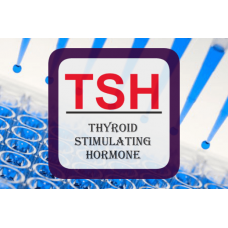Shopping Cart
0 item(s) - $0.00Thyroid Stimulating Hormone ELISA - TSH
Availability: In Stock
Add to Compare
Enzyme Immunoassay for the Quantitative Determination of Thyroid Stimulating Hormone (TSH) in Human Serum
FOR RESEARCH USE ONLY. NOT FOR USE IN DIAGNOSTIC PROCEDURES
SUMMARY
The determination of serum or plasma levels of thyroid stimulating hormone (TSH or thyrotropin) is recognized as a sensitive method in the diagnosis of primary and secondary hypothyroidism.1 TSH is secreted by the anterior lobe of the pituitary gland and induces the production and release of thyroxine (T4) and triiodothyronine (T3) from the thyroid gland.2 It is a glycoprotein with a molecular weight of approximately 28,000 daltons, consisting of two chemically different subunits, alpha and beta.
Although the concentration of TSH in the blood is extremely low, it is essential for the maintenance of normal thyroid function. The release of TSH is regulated by a TSH-releasing hormone (TRH) produced by the hypothalamus. The levels of TSH and TRH are inversely related to the level of thyroid hormone. When there is a high level of thyroid hormone in the blood, less TRH is released by the hypothalamus, so less TSH is secreted by the pituitary. The opposite action will occur when there is decreased thyroid hormone in the blood. This process is known as a negative feedback mechanism and is responsible for maintaining the proper blood levels of these hormones.
TSH and the pituitary glycoproteins: luteinizing hormone (LH), follicle-stimulating hormone (FSH), and human chorionic gonadotropin (hCG), have identical alpha chains.2 The beta chains are distinct but do contain regions with identical amino acid sequences. These regions of homology can cause considerable cross-reactivity with some polyclonal TSH antisera. The use of a monoclonal antibody in UNIAs TSH ELISA test eliminates this interference, which could result in falsely elevated TSH values in either menopausal or pregnant females, a population whose evaluation of thyroid status is clinically significant.
PRINCIPLE OF THE TEST
The United Immunoassay TSH ELISA test is based on the principle of a solid phase enzyme-linked immunosorbent assay.9,10 The assay system utilizes a unique monoclonal antibody directed against a distinct antigenic determinant on the intact TSH molecule. Mouse monoclonal anti-TSH antibody is used for solid phase immobilization (microtiter wells), and goat anti-TSH antibody is in the antibody-enzyme (horseradish peroxidase) conjugate solution. The test sample is allowed to react simultaneously with the two antibodies, resulting in the TSH molecules being sandwiched between the solid phase and enzyme-linked antibodies. After a 60-minute or overnight incubation at room temperature, the solid phase is washed with water to remove unbound labeled antibodies. A solution of 3,3,5,5-Tetramethylbenzidine (TMB) is added and incubated for 20 minutes, resulting in the development of a blue color. The color development is stopped with the addition of 1N HCl, and the resulting yellow color is measured spectrophotometrically at 450 nm. The concentration of TSH is directly proportional to the color intensity of the test sample.
EXAMPLE OF STANDARD CURVE
Results of a typical standard run with optical density readings at
450 nm shown in the Y axis against Thyroid Hormone concentrations shown in the X axis. This standard curve is for the purpose of illustration only, and should not be used to calculate unknowns. Each user should obtain his or her own data and standard curve.

| General | |
| ANALYTE GROUP | Thyroid Stimulating Hormone (TSH) |
| GROUPING | Hormones:Thyroid |
| PRODUCT NAME | ELISA |
| STORAGE | Store the kit at 2-8°C |
| COUNTRY OF ORIGIN | USA |
| DISCOUNTS | Bulk Packaging; High Volume |
| ELISA | |
| TESTS PER KIT | 96 (12 x 8) |
| CALIBRATION RANGE | 0 - 25 uIU/mL (Recommended) |
United Immunoassay, Inc. © 2024


































